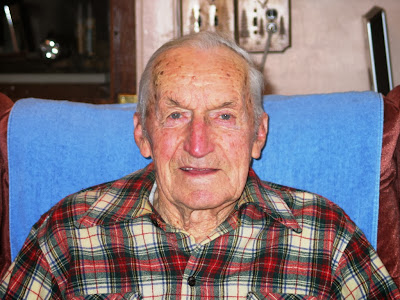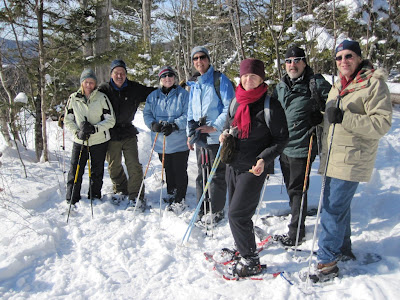Harold Butler Putnam, 99, of Cambridge, Vermont, passed away on Tuesday, December 24, 2013 with family by his side. He was born on September 8, 1914 in the farmhouse at the Putnam Family Farm in Cambridge. His parents were the late J. Kinsley Putnam and Mabelle (Butler) Putnam.
Traveling by horse and buggy, Harold attended and graduated from Cambridge High School in Jeffersonville as the class Valedictorian in 1931. He attended the Vermont School of Agriculture, now Vermont Technical College, graduating in 1932. Following graduation he had a job with the Agricultural Conservation Program for a few years. Many years the farm hosted sugar-on-snow parties for the ACP staff.
On June 16, 1946 Harold married Lois Gould and together they ran the farm and raised four children. They were married for 53 years.
Harold was a lifelong dairy farmer, the 4th generation of Putnams on his dairy farm. He was innovative for his time, embracing change and adopting new technology. Electricity came to the farm in 1941. Harold was instrumental in getting it to this area by helping to secure right-of-ways from multiple landowners. Before baled hay he installed in his barn a hay dryer for drying hay faster. He later built a milking parlor and converted his tie stall barn to loose housing, both very uncommon at that time. Many years later he built a new modern design barn with a larger milking parlor and continued the loose housing concept for the cows.
Before the era of home freezers, he was a founding member and eventually President of Cambridge Cooperative Lockers, Inc., a village store that housed freezer space for food locker rental to community members. He was a trustee of the Cambridge Cemetery Association at the Mountain View Cemetery in Cambridge for 50 years. He was on the board of directors for Richmond Cooperative Association, Inc., a milk marketing co-op. He was active in many other farm organizations, including the Farm Bureau Co-op (a maple syrup co-op) and the United Farmers Cooperative Creamery Association. He was a deacon at the Cambridge United Church for many years. As a youth Harold was very active in the local 4-H and as an adult he was a 4-H leader for the children in the area.
Before the advent of the modern bulk tanks, milk was stored and kept cool in milk cans bathed in cool spring water. In 1950 Harold purchased a local milk route and picked up milk cans from the coolers at area farms for several years. For many years, he also drove a station wagon school bus to pick up school children from some of the back roads around Cambridge.
Maple sugaring was always a large part of Harold’s annual adventures. He witnessed many changes as he began the early years with buckets and gathering sap by horse and sled. Over the years this evolved through experimental trials using plastic tubing to collect the sap and then progressed to using vacuum to help increase sap yields. He then was able to witness the building of the 5th sugarhouse on the farm with the latest hi-tech tools for collecting sap and making syrup.
One of Harold’s hobbies was the growing and preservation of an old Vermont heritage flint corn. He grew and harvested this special variety for many years, marketing his corn meal from “Pager’s Gristmill” to local residents and area food establishments.
He was considered a local historian and often sought after by those with questions of how things used to be. He was instrumental in helping to establish the Cambridge Historical Society.
Harold is survived by three children: Beth (Putnam) Cole of Cambridge and her husband Jerome Cole; William H. Putnam of Cambridge and his wife Donna (Wilkinson) Putnam; and George S. Putnam of Jeffersonville and his wife Nancy (Carpenter) Putnam. Their families include 13 grandchildren and nine great grandchildren: Jennifer (Cole) Patterson, her husband Andrew Patterson and children Lillian and Rachel; Rebecca (Cole) Towne, her husband Steven Towne and daughter Anna; Geoffrey Cole, his wife Katie (Morrow) Cole and son Hunter; Deborah (Cole) Governale, her husband Nicholas Governale and son Evan; Jason Putnam; Travis Putnam and his wife Hollie Putnam; Carrie (Wilkinson) LaFountain, her husband David LaFountain and children Devin and Shyanne; Sarah (Wilkinson) Bradshaw, her husband Jeremy Bradshaw and children Haylee and Bryce; James Wilkinson; Craig Wilkinson; Brian Putnam; Emily Putnam; Laura Putnam. He also leaves a sister-in-law, Harriet (Gould) Karr Burnham, a special friend Barbara (Brewster) Howard, and several nieces, nephews and cousins.
Harold was predeceased by his wife in 1999, his son John K. Putnam in 1971, and his sister Elizabeth (Putnam) Taylor in 1997.
The family wishes to express their thanks to Lamoille Home Health & Hospice, Franklin County Rehab Center, and the many caregivers who helped with Harold’s care in recent years. Special thanks to Nancy Knapp, Theresa Wilcox, Patty Wells, Mary Skog, Sue McAdoo, Lorinda Smith, Betsy MaGee and the many volunteers for their caring devotion to Harold’s care.
Visiting hours will be held on Friday, December 27, 2013 from 3:00 – 6:00 p.m. at A. W. Rich Funeral Home – Fairfax Chapel, 1176 Main St., Fairfax, VT 05454. Funeral services will be held on Saturday, December 28, 2013 at 11:00 a.m. at United Church of Fairfax. Memorial donations in Harold’s memory may be made to the Cambridge Historical Society, P.O. Box 16, Jeffersonville, VT 05464. Inurnment will be private and at the convenience of the family.
*************************
A short obituary appeared in the Burlington Free Press on 12/26/13
here. The long obituary above was published online on 12/26/13
here. Bill took the photo above on 12/14/03 at Put's Palace. I think the shirt Pager is wearing is the shirt discussed in the Putnam family history on p. 47, photo on p. 48.

















